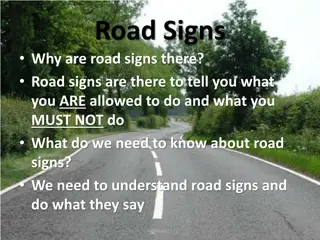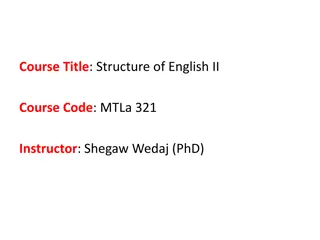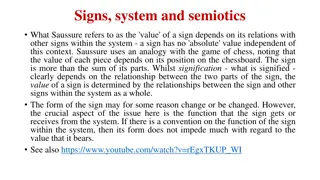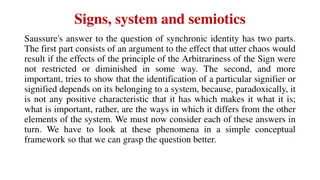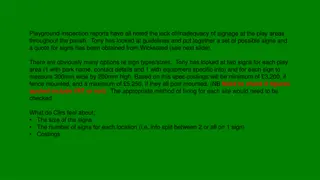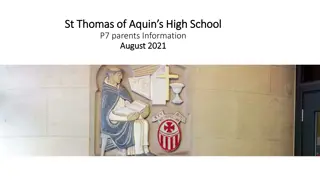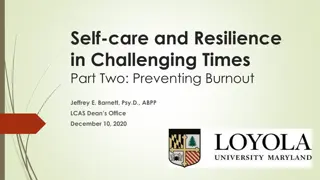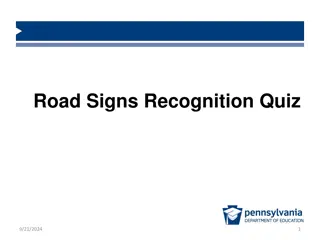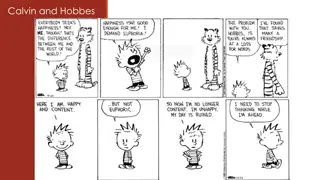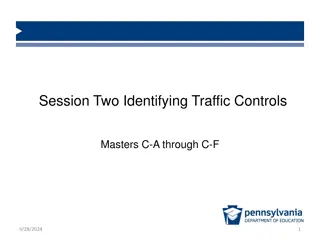Analysis of Signs of the Times by Thomas Carlyle (1829)
Thomas Carlyle's analysis of the Signs of the Times delves into the cultural commentary of his era, emphasizing the dominance of the Mechanical Age. He critiques the contemporary obsession with danger and crisis, highlighting the shift towards mechanization and technological advancements. Carlyle discusses the impact of machinery on various aspects of society, such as work, transportation, and communication, while acknowledging the benefits and consequences of this industrial revolution.
Download Presentation

Please find below an Image/Link to download the presentation.
The content on the website is provided AS IS for your information and personal use only. It may not be sold, licensed, or shared on other websites without obtaining consent from the author.If you encounter any issues during the download, it is possible that the publisher has removed the file from their server.
You are allowed to download the files provided on this website for personal or commercial use, subject to the condition that they are used lawfully. All files are the property of their respective owners.
The content on the website is provided AS IS for your information and personal use only. It may not be sold, licensed, or shared on other websites without obtaining consent from the author.
E N D
Presentation Transcript
SIGNS OF THE TIMES 2 Thomas Carlyle(1829) Analysis Signs of the Times, first appeared in the Edinburgh Review in 1829. Rather than reviewing the books listed namely, William Alexander MacKinnon s On the Rise, Progress, and Present State of Public Opinion (1829), Edward Iriving s The Last Days: A Discourse on the Evil Character of These Our Times (1829), and the anonymous Anticipation; or, an Hundred Years Hence (1829) Carlyle takes the opportunity to deliver some rather interesting cultural commentary. He begins by criticizing the contemporary histrionics of danger and crisis. It is obvious, he says, that the present faces a crisis. This crisis has called forth a plethora of vaticinations, both from the religious and irreligious. The one announce he writes, that the last of the seals is to be opened, positively, in the year 1860; and the other assure us, that the greatest happiness principle is to make a heaven of earth, in a still shorter time (441). But rather than getting into a frenzy, Carlyle calls for a calmer, more serious inspection and reading of the signs of our own time. In brief, Carlyle characterized his age not as a Heroical, Devotional, Philosophical, or Moral Age, but, above all others, the Mechanical Age (442).
SIGNS OF THE TIMES 2 Thomas Carlyle(1829) Analysis It is the Age of Machinery, in every outward and inward sense of that word; the age which, with its whole undivided might, forwards, teaches and practises the great art of adapting means to ends. Nothing is now done directly, or by hand; all is by rule and calculated contrivance. For the simplest operation, some helps and accompaniments, some cunning abbreviating process is in readiness. Our old modes of exertion are all discredited, and thrown aside. On every hand, the living artisan is driven from his workshop, to make room for a speedier, inanimate one. The shuttle drops from the fingers of the weaver, and falls into iron fingers that ply it faster. The sailor furls his sail, and lays down his oar; and bids a strong, unwearied servant, on vaporous wings, bear him through the waters. Men have crossed oceans by steam; the Birmingham Fire-king has visited the fabulous East; and the genius of the Cape were there any Camoens now to sing it, has again been alarmed, and with far stranger thunders than Gama s. There is no end to machinery. Even the horse is stripped of his harness, and finds a fleet fire- horse invoked in his stead. Nay, we have an artist that hatches chickens by steam; the very brood-hen is to be superseded! For all earthly, and for some unearthly purposes, we have machines and mechanic furtherances; for mincing our cabbages; for casting us into magnetic sleep. We remove mountains, and make seas our smooth highways; nothing can resist us. We war with rude Nature; and, by our resistless engines, come off always victorious, and loaded with spoils (ibid).
SIGNS OF THE TIMES 2 Thomas Carlyle(1829) Analysis Thanks to industry and technology, mankind is better fed, clothed, lodged, and accommodated than in any time in history. At the same time, the Mechanical Age has dramatically altered social systems. The rise of the periodical press is partly one consequence of the Mechanical Age. We have machines for education. We also have religious machines. Indeed every little sect among us, Unitarians, Utilitarians, Anabaptists, Phrenologists, must each have its periodical, its monthly or quarterly magazine hanging out, like its windmill, into the popularis aura, to grind meal for the society (443). Society then, as now, revolved around new technologies. Another consequence of the Mechanical Age is the building of institutions and societies. No Queen Christina, Carlyle observes, needs to send for her Descartes; no King Frederick for his Voltaire. We now have recourse to Royal and Imperial Societies and Institutions, Bible Societies, Religious Tract Societies, and, soon after Carlyle published this essay, the British Association for the Advancement of Science. Men are [now] grown mechanical in head and in heart, as well as in hand (444). Our whole manner of existence has fundamentally and dramatically changed. The Mechanical philosophy, as Carlyle understood it, has altered the state of science. Metaphysical and Moral Sciences are now in disrepute. Instead, the science of the age, he says, is physical, chemical, physiological, and, in all shapes, mechanical (445).
SIGNS OF THE TIMES 2 Thomas Carlyle(1829) Analysis Mechanical principles have become so pervasive that they have also affected politics. Society is now seen as a machine and mere political arrangements have also been mechanized. It is no longer the moral, religious, spiritual condition of the people that is our concern, but their physical, practical, economical conditions, as regulated by public laws (448). This body-politic has now become an idol of worship. But while the domain of Mechanism was once considered embracing, it is by no means the most important. Carlyle makes a distinction between man s dynamical and mechanical nature. In the dynamical springs the mystery of love, fear, wonder, enthusiasm, poetry, religion, all which he says, have a truly vital and infinite character (449). In this sense, according to Carlyle, our mechanical side can never led us to happiness. Moreover, both Science and Art have, from first to last, been the free gift of Nature; an unsolicited, unexpected gift often even a fatal one (ibid.). Because both grow spontaneously, it is dangerous to institutionalize either science or art. Christianity, for example, the crowning glory, or rather the life and soul, of our whole modern culture, has increasingly declined and decayed under the burden of institutionalization (450). Was it by institutions and establishments, Carlyle asks, that Christianity first arose and spread among men?
SIGNS OF THE TIMES 2 Thomas Carlyle(1829) Analysis Not so; on the contrary, in all past and existing institutions for those ends, its divine spirit has invariably been found to languish and decay. [Rather] It arose in the mystic deeps of man s soul; and was spread abroad by the preaching of the word, by simple, altogether natural and individual efforts; and flew, like hallowed fire, from heart to heart, till all were purified and illuminated by it; and its heavenly light shone, as it still shines, and as sun or star will ever shine, through the whole dark destinies of man (ibid). This tacit, anti-Catholic rhetoric is made even clearer when Carlyle maintains that the Reformation had an invisible, mystic, and ideal aim: the result was indeed to be embodied in external things; but its spirit, its worth, was internal, invisible, infinite (ibid). Although man has both a mechanical and a dynamical nature, he is undoubtedly not a creature and product of Mechanism. Rather, he is its creator and producer. This observation should be obvious, but Carlyle claims that many in the Mechanical Age have forgotten this all-important distinction. However, we must not deny the dynamical nor the mechanical aspects of human nature. Indeed, both, says Carlyle, need to be cultivated. Undue cultivation of the inward or Dynamical province leads to idle, visionary, impracticable courses, and, especially in rude eras, to Superstition and Fanaticism, with their long train of baleful and well-known evils. Undue cultivation of the outward, again, though less immediately prejudicial, and even for the time productive of many palpable benefits, must, in the long-run, by destroying Moral Force, which is the parent of all other Force, prove not less certainly, and perhaps still more hopelessly, pernicious (452).
SIGNS OF THE TIMES 2 Thomas Carlyle(1829) Analysis It is this, unbalanced understanding of the dynamical and mechanical that characterizes the Mechanical Age. The truth, writes Carlyle, is that men have lost their belief in the Invisible, and believe, and hope, and work only in the Visible (ibid). God, in short, has become the machine.With the mechanization of God, religion has dramatically changed. Indeed, it has been lost. Religion in most countries, more or less in every country, is no longer what it was, and should be, a thousand-voiced psalm from the heart of Man to his invisible Father, the fountain of all Goodness, Beauty, Truth, and revealed in every revelation of these; but for the most part, a wise prudential feeling grounded on mere calculation; a matter, as all others now are, of Expediency and Utility; whereby some smaller quantum of earthly enjoyment may be exchanged for a far larger quantum of celestial enjoyment. Thus Religion too is Profit, a working for wages; not Reverence, but vulgar Hope or Fear (455). With religion, literature and morality have also lost its way, says Carlyle. Poetry has lost its beauty. It has been replaced with brute strength. Self-denial, the parent of all virtue, has given way to instant self-gratification. Virtue is Pleasure, is Profit; no celestial, but an earthly thing (456). In the end, we worship and follow after Power ; we shun truth and seek ambition, honor, and popularity (457).
SIGNS OF THE TIMES 2 Thomas Carlyle(1829) In a powerful conclusion, Carlyle writes: Thus, while civil liberty is more and more secured to us, our moral liberty is all but lost. Practically considered, our creed is Fatalism; and, free in hand and foot, we are shackled in heart and soul with far straiter than feudal chains. Truly may we say, with the Philosopher, the deep meaning of the Laws of Mechanism lies heavy on us ; and in the closet, in the Marketplace, in the temple, by the social hearth, encumbers the whole movements of our mind, and over our noblest faculties is spreading a nightmare sleep (ibid.) But Carlyle remains optimistic. Technology is not the problem. It is how we use it. Indeed, it is still possible to recover the wisdom of our forefathers. Although the time is sick and out of joint, these two hostile influences in man, the dynamical and the mechanical, the old and the new, have always existed. What we need is balance and constant intercommunion. What we need is another majestic reformation, another majestic Luther. But in order to reform a nation, we must, says Carlyle, begin with ourselves (459).

 undefined
undefined




